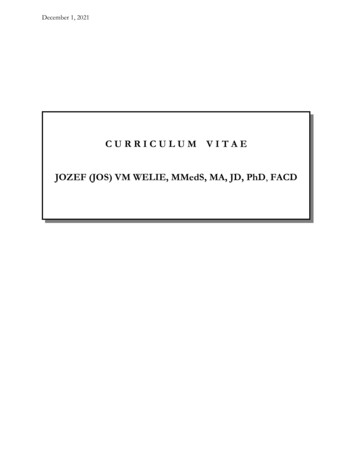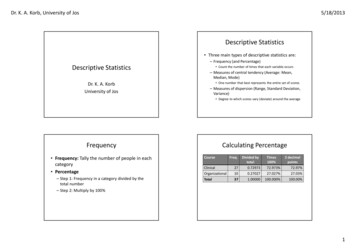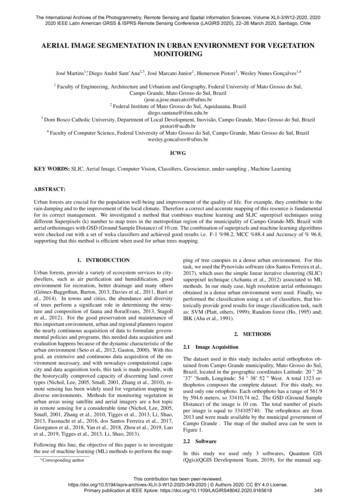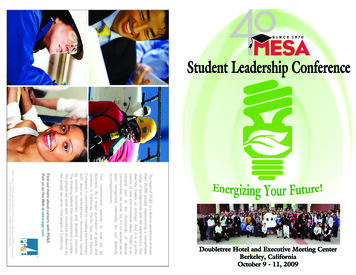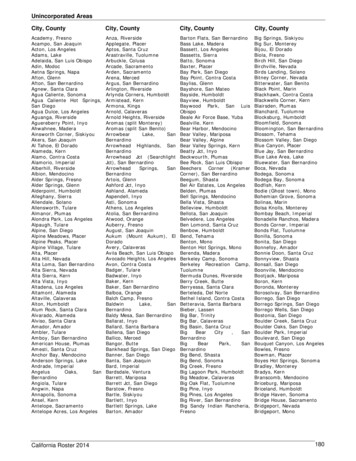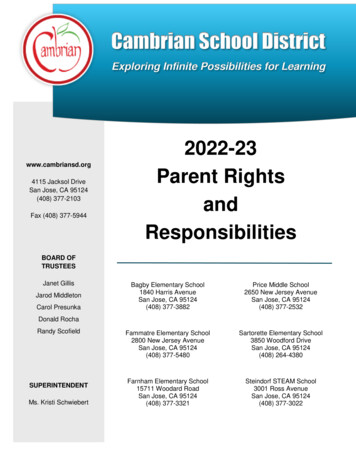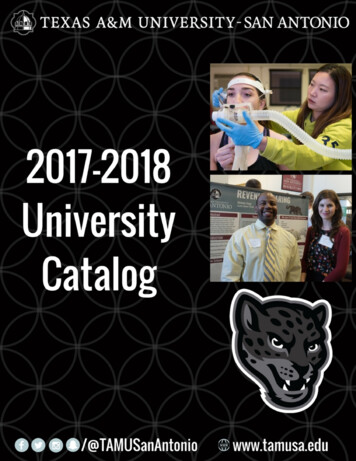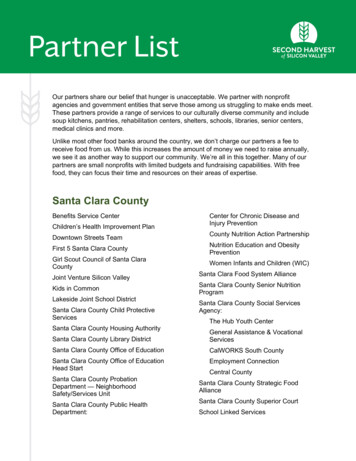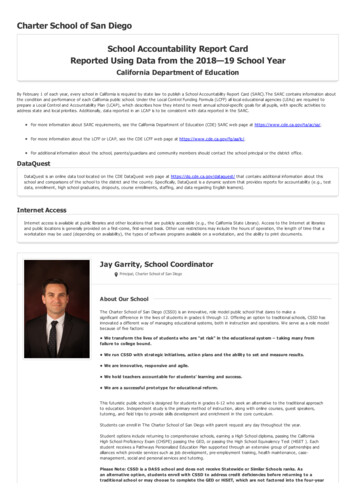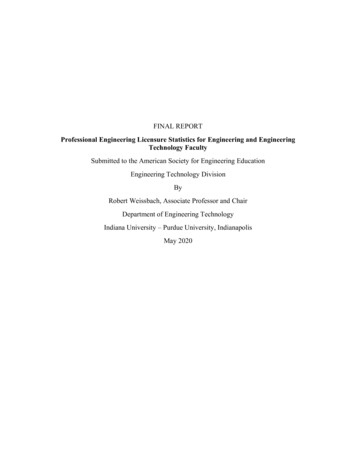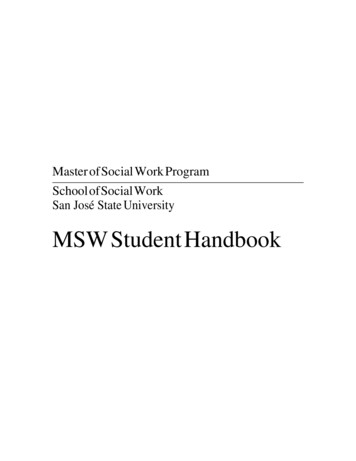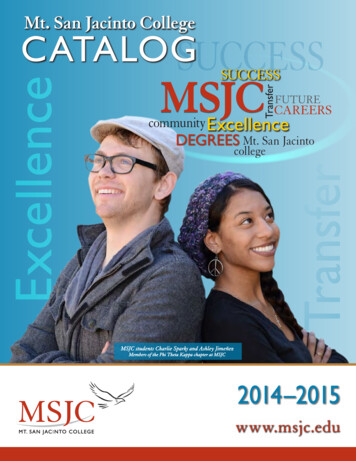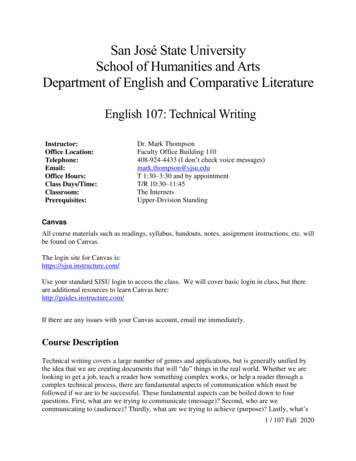
Transcription
San José State UniversitySchool of Humanities and ArtsDepartment of English and Comparative LiteratureEnglish 107: Technical WritingInstructor:Office Location:Telephone:Email:Office Hours:Class Days/Time:Classroom:Prerequisites:Dr. Mark ThompsonFaculty Office Building 110408-924-4433 (I don’t check voice messages)mark.thompson@sjsu.eduT 1:30–3:30 and by appointmentT/R 10:30–11:45The InternetsUpper-Division StandingCanvasAll course materials such as readings, syllabus, handouts, notes, assignment instructions, etc. willbe found on Canvas.The login site for Canvas is:https://sjsu.instructure.com/Use your standard SJSU login to access the class. We will cover basic login in class, but thereare additional resources to learn Canvas here:http://guides.instructure.com/If there are any issues with your Canvas account, email me immediately.Course DescriptionTechnical writing covers a large number of genres and applications, but is generally unified bythe idea that we are creating documents that will “do” things in the real world. Whether we arelooking to get a job, teach a reader how something complex works, or help a reader through acomplex technical process, there are fundamental aspects of communication which must befollowed if we are to be successful. These fundamental aspects can be boiled down to fourquestions. First, what are we trying to communicate (message)? Second, who are wecommunicating to (audience)? Thirdly, what are we trying to achieve (purpose)? Lastly, what’s1 / 107 Fall 2020
the best format to communicate in? Video, writing, an app? The answers to these questions startas the launching off point for all the work we will be doing this semester.A second major focus will be how do we communicate technical information to non-experts?Our documents are used by business people trying to decide whether or not to fund a project. Ourdocuments are used by customers to figure out how to use products. How do we translatecomplex computer or engineering concepts into language that the average person can understandand use? This is further complicated by the fact that we ourselves are probably not experts onevery topic that we’re asked to write about. What strategies can we as writers use to become“expert enough” to write about a topic with accuracy and authority?Lastly, we will focus on testing how useful the writing we do in this class is. It’s one thing tofinish a document, but can someone else use it to achieve what they need to achieve? How do weknow if our document works?Department GoalsStudents will demonstrate the ability to: G1. Read closely in a variety of forms, styles, structures, and modes, and articulate thevalue of close reading in the study of literature, creative writing, or rhetoric. (Students aretaught and will use rhetorical analysis to make sense of the reading assignments thatstretch across many genres covered in this class.) G2. Show familiarity with major literary works, genres, periods, and critical approachesto British, American, and World Literature. (This is a technical writing class. Studentwork may or may not engage with literature, according to their interests.) G3. Write clearly, effectively, and creatively, and adjust writing style appropriately to thecontent, the context, and nature of the subject. (This is a class that creates documents thatwill “do” things in the real world. Our work is contextually grounded to the real-worldsituations each major assignment will engage.) G4. Develop and carry out research projects, and locate, evaluate, organize, andincorporate information effectively. (Assignments #1, #2, #6, and #7 require significantresearch of outside material.) G5. Articulate the relations among culture, history, and texts. (Understanding the culturaland historical origins of current technical writing genres are key to understanding thetasks to be done.)Course Learning Goals2 / 107 Fall 2020
By the end of this class, you will be able to: Engage in best practices when working remotely both individually and as teams. Apply rhetorical analysis methods to documents as a means of assessing their usability. Write across a number of technical genres using a rhetorical model that looks at message,audience, and purpose as a means of starting any technical writing project. Be able to recognize and communicate using the most common technical writing genres. Use a number of strategies to explain technical topics to non-expert audiences. Develop and deploy user testing methods for determining document usefulness. Use research strategies to understand technical topics to the level that they can becommunicated to non-experts with authority. Have a realistic pathway to employment through work on job-finding strategies,resumes/cover letters, and job interviewing techniques.Required Readings and Classroom ToolsTechnology. There are no required books for this class. Please spend the money on tech. I knowtimes are tough, but if you are serious about being a tech writer, you should have your owncomputer. Chefs carry their knives, carpenters bring their favorite tools to a job, and you haveyour laptop.But. I realize tech might be an investment you’re currently not in the position to make. Noproblem. I don’t want your lack of access to tech to hamper your ability in this class. If at anypoint you are unable to do work because you can’t get the tech tools you need, let me know andwe can work around it.Canvas. Because I’m sensitive to the amount of paper a writing/editing class can consume, thiscourse will make extensive use of Canvas, an online classroom management tool. Your readingsand assignments will be posted as .pdfs for you to download and print (as you see fit).You will still need to have readings open during class. I will give random pop quizzesthroughout the semester to test whether you are keeping up with the reading.Additionally, I will use Canvas to communicate with you during the week, and will be returningdrafts to you via email/Canvas.I will also use Canvas to make your grades available to you throughout the semester, so youknow where you stand at all times.3 / 107 Fall 2020
Every semester I seem to have a student or two who can’t quite figure the technology out. Ifyou are having any problems logging on to your account, please contact me! Your successin this class is dependent on this!Readings. There is no reader or textbook for this class. All readings will be posted on Canvas.This allows me to pick and choose from the best writing out there, as well as adjust readingdifficulty to the level of our class. I fully understand that some of this isn’t always the mostinteresting reading in the world. However, these chapters and articles are crucial to building aclassroom vocabulary for the work we are doing. There is no busy work in this class. Allreadings have been curated to make sure they are of use to class projects. You are expected toread EVERYTHING and come to class prepared to discuss each article. If you start slackinghere, I can guarantee you will struggle with the assignments.Classroom Tools: Software Unless otherwise specified, assignments should be turned in as a Word (.doc) file.Microsoft Office is free/cheap to SJSU students. Additionally, we will be learning some of the most common tech tools used in technicalwriting, such as SnagIt, DITA, and Madcap Flare. I’ll provide links when appropriate. If there are ANY other applications that you would like to learn, please don’t hesitate toask me about them. I’m happy to accommodate your individual research interests.Software Links: Microsoft soft-students/index.html SnagIt:We will download the trial version of SnagIt when we get to that part of the semester.(Don’t download these early!) Slack (for the final project):https://slack.com/ All other software will be linked to from Canvas.4 / 107 Fall 2020
Course Requirements and AssignmentsASSIGNMENT #1: JOB APPLICATION MATERIALSFor this assignment, you will research and find a job ad to apply to, and then create anappropriate resume and introductory email using the job ad as a guide.ASSIGNMENT #2: PROPOSAL ADAPTATIONFor this project, you will be writing a proposal, adapting information that I will beproviding you to the proposal genre. You may also choose your own proposal topic.ASSIGNMENT #3: DEVELOPER GUIDEUsing a Word template, you will properly format a developer guide for programmers atFacebook and Twitter to implement a photo-sharing app. The data for this projectcomes from an actual client.ASSIGNMENT #4: PRESENTATION OF TECHNICAL MATERIAL TO A NONEXPERT AUDIENCEYou will create a short video that explains a technical topic or process to the class, alongwith a one-sheet handout that summarizes the technology.ASSIGNMENT #5: COMPUTER TUTORIALUsing screen-capturing software, you will produce a short computer tutorial thatexplains how to do a moderately difficult computer task in both print and video formats.You will also user test your instructions and write a user testing report.ASSIGNMENT #6: PROFESSIONAL INTERVIEW MEMOIn this assignment, you will find and interview a local professional about their use oftechnical communication in the workplace. After completing this interview, you willsubmit your interview questions, as well as a two-page memo that summarizes yourfindings.ASSIGNMENT #7: TECHNICAL MANUAL AND WEBSITE (GROUP ASSIGNMENT)For the major project in this class, you will work in groups of three or four to produce auser manual that accompanies a phone app for iPhone or Android. The manual shoulddescribe major features, explain basic tasks, and include other sections of user manualsas appropriate to the project. We will be learning and using DITA and/or Madcap Flareto create an online version of your manual. You will present your manual in the finalsslot to a panel of local tech professionals who will ask questions and assess your work.5 / 107 Fall 2020
*ONE-UNIT ENHANCEMENTThis class has shifted from 3 to 4 units. In some ways, this brings the workloadin line with the unit count. In addition, I am introducing an Augmented Reality project andlessons of the Markup language DITA to expand course coverage.Final Exam. Your group will present its final project in the final examination schedule. You willbe graded as to how well you articulate your group’s work in light of all the work we’ve donethis semester.Second Chance. I expect perfection, but realize that you’re still learning this stuff. Because I’ma tough grader, I’ll let you redo one major assignment and submit it for full credit—the onlyrequirement being that you also turn in a memo describing your errors and the ways that youfixed them. The grade on this second attempt will replace the first. The second chance is notavailable if you didn’t turn anything in the first time.In-Class Exercises. On most days that we discuss readings, there will be short, in-class writingassignments to practice various writing techniques and strategies. These may be group-based, orindividually based. I attempt to cater these exercises to issues that I’m seeing in your work.These will generally be graded for completion. Each exercise won’t be worth many points, butthey will add up. You generally have until the end of the day to finish these.Student WorkloadSJSU classes are designed such that in order to be successful, it is expected that students willspend a minimum of forty-five hours for each unit of credit (normally three hours per unit perweek), including preparing for class, participating in course activities, completing assignments,and so on. More details about student workload can be found in University Policy S12-3 athttp://www.sjsu.edu/senate/docs/S12-3.pdf.GRADE INFORMATIONRelative Weights for Determining the Final Course Grade: The letter grades you earn onindividual assignments are translated into numbers to be crunched in order to determine theoverall course grade. An F is 0, a D- is 1 and so on . . . . all the way to A , which is 12.Classroom Participation, Homework, In-Class Exercises, QuizzesAssignment #1: Job Application PacketAssignment #2: Proposal AdaptationAssignment #3: Developer GuideAssignment #4: Oral Presentation of Technical MaterialAssignment #5: Computer Tutorial20%10%10%10%10%15%6 / 107 Fall 2020
Assignment #6: Professional Interview MemoAssignment #7: User Manual & Website10%15%Grading Criteria: The following paragraphs sum up my criteria for grading work. Though Iassign number grades for each essay, here is a general guide to my grading.An "A" is awarded to work that is consistently excellent. It is professional, publishable,generically appropriate, and contains no more than two minor errors.A "B" is awarded to work that is consistently above average—and occasionally excellent. Whiledocuments may not exhibit the same depth of research, analysis, or polish, the author has done acompetent job. This document would be publishable with another round of revision.A "C" is awarded to work that is in the ballpark of what a document is attempting to achieve.The author does many things right, but there are omissions or errors that significantly damage adocument’s usefulness. The author, while not yet accomplished in the craft of technical writing,is producing competent work that would require significant revision on the part of a moreexperienced technical writer.A "D" is awarded to work that shows developing competence. The author understands theconversation to be addressed, but it’s a poor effort. This is the type of work that would berejected and assigned to another writer.An "F" is awarded to work that demonstrates incompetence or that is fatally incomplete.Grading Shorthand:A ProfessionalB InternC StudentD Not Cutting ItWithin any of the letter grade ranges (e.g. B /B/B-), the assignment of a or - grade will reflectstronger ( ) or weaker (-) completion of the goals of the assignment.“A minimum aggregate GPA of 2.0 SJSU Studies (R, S, & V) shall be required of all students asa graduation requirement.” To see full text, review University Policy S11-3 OOM PROTOCOLUnderstanding. I understand that we are in a global pandemic generously seasoned with fires,heat waves, power outages, evacuations, Constitutional crises, protests, white supremacy, murderhornets, etc. I also understand that many of us are cramped at home with family or roommates.Some of us are trying to get our own kids through school. Some of us have nine other people7 / 107 Fall 2020
trying to use the internet. Some of us have lousy or no internet. I understand all of this and factorit into grading. Keep in contact with me and let me know how I can help.Netiquette. Lordy, what a terrible word. Remember that you are in a professional environmentand that you’re training to be in an ever-more professional environment. Be yourselves, but berespectful of each other. No trolling. I’m the only one allowed to troll. Being able to disagree orcritique without being mean is a skill you need to develop AS IS the ability to take fair criticismwithout getting your feelings hurt. Without the context of verbal communication, writtencommunication seems much harsher than it’s usually intended and sarcasm doesn’t always comeacross. Don’t take out your frustration on others and also realize that the person next to youmight be having the hardest week of their life.Cameras. Talking to black boxes sucks. I would prefer you to keep your camera on during class.This is the professional standard at the places you’ll end up working. Wear a hat and sunglassesif you need to, pause if you have a huge sneeze coming on. If there’s a reason you can’t leaveyour camera on, please let me know.Attendance. I guarantee that missing more than a few days will significantly affect yourunderstanding of the material. Please notify me if you are unable to attend class. DO NOTDISAPPEAR ON ME. In the past, students who have vanished without explanation for morethan two or three classes have failed this class. I am a human being. If you are experiencing anongoing crisis, please let me know and we will come to some sort of arrangement.Lateness. I understand that we’re all late every now and then, but a routine failure to arrive ontime will significantly affect your participation grade in this class. If there is something that willmake you late to class, whether reoccurring or not, please let me know. That being said, don’t letpotential lateness keep you from coming to class.Grading class participation. I expect everyone to participate in class. This means you areawake and engaged, having done the readings and the homework, are actively participating indiscussion and are working constructively when we break into small groups. A participationgrade allows me to reward those students who are actively engaged in each class, while beingable to account for students who are routinely late, absent, sleepy, or engaged in non-classrelated activity during our brief time together. An “A” means always engaged, a “B” meansmostly engaged. A “C” is sometimes engaged.Late work. I don’t accept it. Part of being a writer is, though the Earth itself may be aflame, youmeet your deadlines. All of them. I understand your life is complicated, with manyresponsibilities pulling you in multiple directions. If you are unable to attend on a day that anassignment is due, it is up to you to make sure that you get me your work before the beginning ofthat class. Some assignments are due at midnight, some are due before class. Be sure to checkwith Canvas.Acting with academic integrity. In both your academic and professional careers, you areexpected to act with integrity. You are in this class for more than a grade, you are here to emergewith actual skills—skills which are not developed through cheating. I am well aware of the essaymills, and have designed this class to make the purchase of or plagiarism from other writing8 / 107 Fall 2020
sources painfully obvious. Though it most likely will not be an issue, any plagiarism will earnyou an automatic “F” in my class. Just do your own work.Technology use. I realize the temptation to refresh your Instagram feed as we delve into theintricacies of dangling participles may be strong. Emailing, texting, swiping right, decapitatingorcs, and engaging in unrelated activities are discourteous and distracting to me and yourclassmates. When potential employers ask about you, this is usually the second thing they askabout. Try not to get distracted.Food and beverages. Feel free to eat and drink during class. No slurping noises, please.My open door policy. I want you to succeed in this class. I’m happy to talk with you at any timeabout the readings, assignments, and any other aspect of the course. Just talk to me after class,send me an email, or arrange to meet with me outside class. COME TO MY ONLINE OFFICEHOURS! My highest compliments from students have always come from the one-on-one help Igive outside of class. In addition to teaching, I’ve worked as a professional writer and editor forthe past 20 years. I’m here to mentor you and help you transition into the workplace. Come talkto me!Contacting me. Please use email to contact me (I don’t check voice messages and I don’tanswer the phone if I’m busy). I check email at 10 am and 2 pm Monday-Thursday and 3pm onFridays. So, don’t expect a response from a panicked email sent at midnight about an assignmentdue the next day.After this class. In addition to my assistance in this class, I extend to all my students an offer tohelp with any future writing issues which may arise once this class is over. In the past, I haveassisted former students with cover letters, updated resumes, grad school applications, and haveeven helped with the abstract of a scientific paper. Additionally, for all students who receive anA in this class, I will happily write a letter of recommendation for any grants, schools, programs,or internships you may be applying to. Also, if you receive an A in this class, you may includeme as a reference in any jobs you might apply to—as long as you haven’t committed anyfelonies in the interim.We get approximately 20 requests per year from local employers looking for graduates from ourprogram. If you do well in this class, I pass your name along and do what I can to make sure youget an interview. Last year alone, 12 students got full-time writing jobs with my help. Work hard,and you can be the next.University PoliciesPer University Policy S16-9, university-wide policy information relevant to all courses, such asacademic integrity, accommodations, etc. will be available on Office of Graduate andUndergraduate Programs’ Syllabus Information web page athttp://www.sjsu.edu/gup/syllabusinfo/”Student Technology ResourcesComputer labs for student use are available in the Academic Success Center athttp://www.sjsu.edu/at/asc/ located on the 1st floor of Clark Hall and in the Associated Students9 / 107 Fall 2020
Lab on the 2nd floor of the Student Union. Additional computer labs may be available in yourdepartment/college. Computers are also available in the Martin Luther King Library.A wide variety of audio-visual equipment is available for student checkout from Media Serviceslocated in IRC 112. These items include DV and HD digital camcorders; digital still cameras;video, slide and overhead projectors; DVD, CD, and audiotape players; sound systems, wirelessmicrophones, projection screens and monitors.SJSU Peer ConnectionsPeer Connections, a campus-wide resource for mentoring and tutoring, strives to inspire studentsto develop their potential as independent learners while they learn to successfully navigatethrough their university experience. You are encouraged to take advantage of their serviceswhich include course-content based tutoring, enhanced study and time management skills, moreeffective critical thinking strategies, decision making and problem-solving abilities, and campusresource referrals.In addition to offering small group, individual, and drop-in tutoring for a number ofundergraduate courses, consultation with mentors is available on a drop-in or by appointmentbasis. Workshops are offered on a wide variety of topics including preparing for the WritingSkills Test (WST), improving your learning and memory, alleviating procrastination, survivingyour first semester at SJSU, and other related topics. A computer lab and study space are alsoavailable for student use in Room 600 of Student Services Center (SSC).Peer Connections is located in three locations: SSC, Room 600 (10th Street Garage on the cornerof 10th and San Fernando Street), at the 1st floor entrance of Clark Hall, and in the LivingLearning Center (LLC) in Campus Village Housing Building B. Visit Peer Connections websiteat http://peerconnections.sjsu.edu for more information.SJSU Writing CenterThe SJSU Writing Center is located in Clark Hall, Suite 126. All Writing Specialists have gonethrough a rigorous hiring process, and they are well trained to assist all students at all levelswithin all disciplines to become better writers. In addition to one-on-one tutoring services, theWriting Center also offers workshops every semester on a variety of writing topics. To make anappointment or to refer to the numerous online resources offered through the Writing Center,visit the Writing Center website at http://www.sjsu.edu/writingcenter.SJSU Counseling ServicesThe SJSU Counseling Services is located on the corner of 7th Street and San Fernando Street, inRoom 201, Administration Building. Professional psychologists, social workers, and counselorsare available to provide consultations on issues of student mental health, campus climate orpsychological and academic issues on an individual, couple, or group basis. To schedule an10 / 107 Fall 2020
appointment or learn more information, visit Counseling Services website athttp://www.sjsu.edu/counseling.11 / 107 Fall 2020
ENGLISH 107 – TECHNICALWRITINGFall 2020· t/r · 10:30-11:45Daily ScheduleMODULE 1Aug 20ClassHomeworkJOB APPLICATION PACKAGE & STRATEGIC WRITINGIntroducing the CourseReview course syllabus. Meet each other.Reading 1Aug 25 Rhetorical CommunicationClass Discuss Reading 1. Discuss Assignment #1: Job Application Packet.Homework Reading 2Homework #1 – Job Ad AnalysisAug 27DUEClassHomeworkThe ResumeHomework #1Discuss Reading 2.Reading 3Sep 1 The Cover Letter, Internal/External OrganizationalCommunicationClass Discuss Reading 3.Homework Reading 4Sep 3 Elements of Visual Design for DocumentsClass Discuss Reading 4.Homework Finish Resume and Email Draft (Bring 4 paper copies to class andsubmit via Canvas)Sep 8DUEClassHomeworkMODULE 2Sep 10ClassHomeworkWorkshop Resume and Email DraftsAssignment #1 Rough DraftWorkshop resume, introduce “the elevator speech.”Reading 6, practice elevator speechesRESEARCH AND PRESENTATION OF TECH MATERIALSWriting with Clarity, Elevator SpeechesDiscuss Reading 6, give elevator speech to instructor.Reading 7, Finish Assignment #1: Job Application PacketSep 15 Writing Proposals #1DUE Assignment #1: Job Application Packet (Printed copy ANDsubmitted via Canvas)12 / 107 Fall 2020
Class Discuss Reading 7, introduce Assignment #2: Proposal Adaptation, goover Homework #2: Analyzing a Technical Proposal.Homework Reading 8, Finish Homework #2Sep 17DUEClassHomeworkWriting Proposals #2Homework #2Discuss Reading 8.Reading 9Sep 22 Dev Guides & Research Of Technical TopicsClass Discuss Reading 9, discuss Assignment #3: Writing a DeveloperGuide.Homework Reading 10, Homework #3: What is an API? (10 pts.)Sep 24 Adaptation Strategies For Non-Expert AudiencesDUE Homework #3: What is an API?Class Discuss Reading 10, Introduce Assignment #4: Group Presentation OfTechnical Material To A Non-Expert Audience, Break into groups,assign topics. Demo: Applying a style guide in Word.Homework Reading 11Sep 29DUEClassHomeworkPresentation Strategies for Non-Expert AudiencesAssignment #2: Proposal AdaptationDiscuss Reading 11, group presentation planning/workshop.Prepare for PresentationsOct 1 Presentations, Day 1Homework Reading 12Oct 6 Presentations, Day 2;Class Finish presentations, discuss Reading 12, introduce Assignment #5:Computer Tutorial.Homework Reading 13MODULE 3 WRITING INSTRUCTIONS & USER TESTINGOct 8 Written Instructions #1Class Discuss Reading 13.Homework Homework #4: Computer Tutorial Planning DocOct 11 (Sunday) Assignment #3: Dev GuideDUE:Oct 15ClassDUEHomeworkWritten Instructions #2, Screen Capture TutorialDiscuss Reading 13.Homework #4: Computer Tutorial Planning DocReading 14: User Testing13 / 107 Fall 2020
Oct 15 Usability Testing #1Class Advanced User Testing, Conduct User Testing on Your Instructions.Homework Start Homework #5: User Testing ReportOct 20 Guest Speaker: Christopher Freeman, Head Tech Writer, Blue CoatSystems (SJSU alum)Homework Finish Draft of Assignment #5: Computer InstructionsOct 22 User Testing #2, Testing Your DraftsDUE Rough Draft Of Assignment #5: Computer InstructionsDUE Homework #5: User Testing Report (End of Day. Also, turn inwith Assignment #5)Class Conduct User TestingHomework Finish Computer InstructionsMODULE 4Oct 27DUEClassCONTENT MANAGEMENT AND TOPIC-BASED WRITINGContent Management SystemsASSIGNMENT #5: Computer InstructionsDiscussion of Reading 16, Break into groups, assign topics. Techworkshop.Oct 29 Content Management Systems, pt. 2Class In-class management work.Homework Reading 17.Nov 3 Software/Product Documentation, Pt #1, Introduce Assignment #6:Professional Interview Memo. Demo: Building a TOC,Class Discuss Reading 17.Homework No homework.Nov 5 Guest Speaker: Joe Fernandez from GoogleClass Listen to Joe, yo.Homework Reading 18,Nov 10 Topic-Based Writing, Introducing DITAClass Discuss Reading 18, DITA Workshop.Homework Start DITA training, Introduction to DITA.MODULE 5 TEAM PROJECTS – PUTTING IT ALL TOGETHERNov 12 Planning Multipage Documents, Style Guides, Group PlanningClass Discuss Assignment #7: Technical Manual, Form Groups, Startplaying with apps, Start Group Planning Doc.Homework Group Planning Doc.14 / 107 Fall 2020
Sunday Nov 15DUE DITA Training Certificate/FormNov 17ClassHomeworkDUEIn-Class Group Work, App User TestingFigure out what needs teaching, write instructions.Finish Group Planning Doc.Group Planning DocNov 19 Guest Speakers: Society for Technical CommunicationHomework Finish Instructions, draft of manual for user testing, finish DITAtraining.Nov 24 User Testing, InstructionsClass Final User Testing on Manual Instructions, finish drafting manual.DUE Draft of Manual InstructionsDec 1ClassDUEHomeworkUser Testing, Entire ManualFinal User Testing & In-Class Group Work.Draft of ManualFinish Final Projects.Dec 3 Professional Interview Discussion, Informal Final GroupPresentationsClass Discussion, Informal presentations, job interview prep, last steps.DUE Assignment #6: Professional Interview MemoHomework Finish Final Projects.Dec 15 Final Projects Due with Final Group Presentation! 9:45(Friday) AM!!!15 / 107 Fall 2020
Using screen-capturing software, you will produce a short computer tutorial that explains how to do a moderately difficult computer task in both print and video formats. . We will be learning and using DITA and/or Madcap Flare to create an online version of your manual. You will present your manual in the finals
